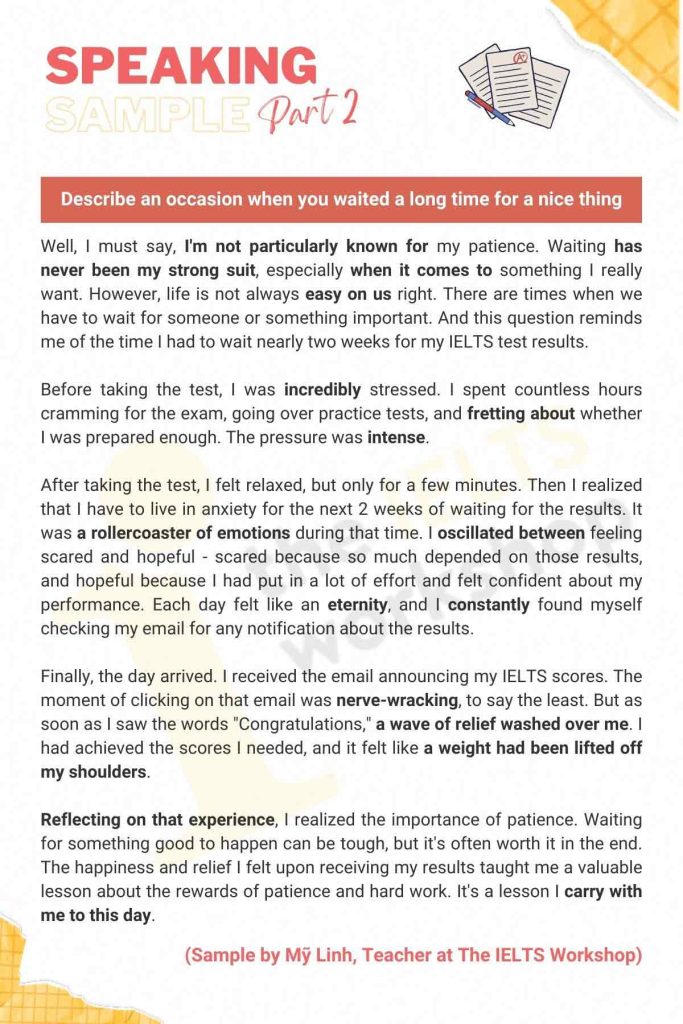Đến với chuyên mục Giải đề IELTS Speaking tuần này, cùng khám phá cách giải Topic: “Describe an occasion when you waited a long time for a nice thing” trong IELTS Speaking Part 2 qua bài mẫu của cô Mỹ Linh của The IELTS Workshop nhé.
Part 2: Describe an occasion when you waited a long time for a nice thing
Describe an occasion when you waited a long time for a nice thing
You should say:
When it happened
What the nice thing was
How long you waited
Why you waited for a long time
And explain how you felt about the experience
Dưới đây là bài mẫu cho topic “Describe an occasion when you waited a long time for a nice thing“.
1. Bài mẫu (Sample)

2. Từ vựng (Vocabulary)
- I’m not particularly known for: không được đặc biệt biết đến bởi … (đức tính nào đó)
- has never been my strong suit: chưa bao giờ là điểm mạnh của mình
- when it comes to: khi nói đến
- easy on us: dễ dàng với chúng ta (như tựa bài “easy on me” của ca sĩ Adele)
- Incredibly: cực kỳ (dùng thay từ very)
- fretting about: lo lắng về (giống to feel worried about)
- Intense: căng
- a rollercoaster of emotions: tàu siêu tốc về mặt cảm xúc (ý nói về việc ta bị vui buồn lẫn lộn liên tục)
- oscillated between (dao động liên tục giữa cảm xúc A và B)
- Eternity: vĩnh cửu (ý nói mỗi ngày dài như vô tận)
- Constantly: liên tục
- nerve-wracking: gây lo lắng
- a wave of relief washed over me: một cảm giác nhẹ nhõm ngập tràn tâm hồn mình
- a weight had been lifted off my shoulders: gánh nặng được nhấc khỏi vai
- Reflecting on that experience: ngẫm nghĩ về trải nghiệm đó
- carry with me to this day: mang theo bên mình đến tận hôm nay
Part 3
On what occasions do people have to wait for a long time?
What do people do while waiting?
Are most people patient while waiting?
Do you like to wait for a long time? Why?
Why do most children have difficulties waiting for a long time?
Do people queue consciously while waiting for the subway train?
1. On what occasions do people have to wait for a long time?
People often have to wait for a long time on various occasions. For instance, waiting in line at government offices for paperwork or licenses, queuing at airports for security checks, or waiting for medical appointments at hospitals are common situations where people experience prolonged waiting periods.
- Queuing: việc xếp hàng
2. What do people do while waiting?
While waiting, people engage in different activities to kill time and boredom. Some might read books or magazines, listen to music, play games on their phones, or chat with others around them. In public places like bus stops or train stations, people often check their phones for messages or browse social media to stay occupied.
- engage in: tham gia
- kill time and boredom: giết thời gian
3. Are most people patient while waiting?
It’s fair to say that not everyone is patient while waiting. While some individuals are used to waiting and remain calm, others might become restless or frustrated, especially if the wait is longer than expected. Factors such as personal temperament, the perceived importance of what they are waiting for, and the environment can influence people’s patience levels.
- Restless: bồn chồn không yên
- Frustrated: cáu gắt bực bội
- Temperament: bản tính
4. Do you like to wait for a long time? Why?
Personally, I don’t particularly enjoy waiting for a long time. Waiting can be tedious and sometimes stressful, especially if it disrupts my plans or schedule. However, I understand that waiting is sometimes necessary and try to make the best of it by finding ways to stay productive or entertained.
- Tedious: nhàm chán
- Disrupt: chen ngang, gây gián đoạn
5. Why do most children have difficulties waiting for a long time?
Most children find it challenging to wait for a long time due to their limited attention spans and developing impulse control. Waiting can feel like an eternity to them, and they may struggle to understand the concept of delayed gratification. Additionally, children often lack the maturity to regulate their emotions, leading to impatience and tantrums when they have to wait.
- attention spans: độ tập trung
- Impulse: sự thôi thúc (Rối loạn kiểm soát xung động (tên tiếng Anh là Impulse Control Disorders, viết tắt là ICDs)
- Gratification: sự thỏa mãn hài lòng
- Maturity: sự trưởng thành
- Tantrums: nổi đóa, giận dữ
6. Do people queue consciously while waiting for the subway train?
In general, people tend to queue consciously while waiting for the subway train. Queueing is a common practice in many cultures and is seen as a fair way to ensure order and efficiency. However, factors such as crowded platforms or time constraints can sometimes lead to less orderly behavior, with people pushing or cutting in line. Overall, most people understand the importance of queuing and strive to follow the rules while waiting for public transportation.
- Constraints: hạn chế
- Orderly: có trật tự, ngăn nắp, hiền hòa
- cutting in line: chen hàng
Bài mẫu bởi cô Mỹ Linh – Giáo viên The IELTS Workshop HCM
Trên đây là bài mẫu cho topic: Describe an occasion when you waited a long time for a nice thing. Các bạn có thể tham khảo các bài mẫu IELTS Speaking Part 2 theo chủ đề của The IELTS Workshop tại đây!
Tham khảo ngay Khóa bổ trợ từng kỹ năng IELTS chuyên sâu của The IELTS Workshop để có thể học và nắm được phương pháp xây dựng câu trả lời cho phần thi IELTS Speaking Part 3 nhé.









